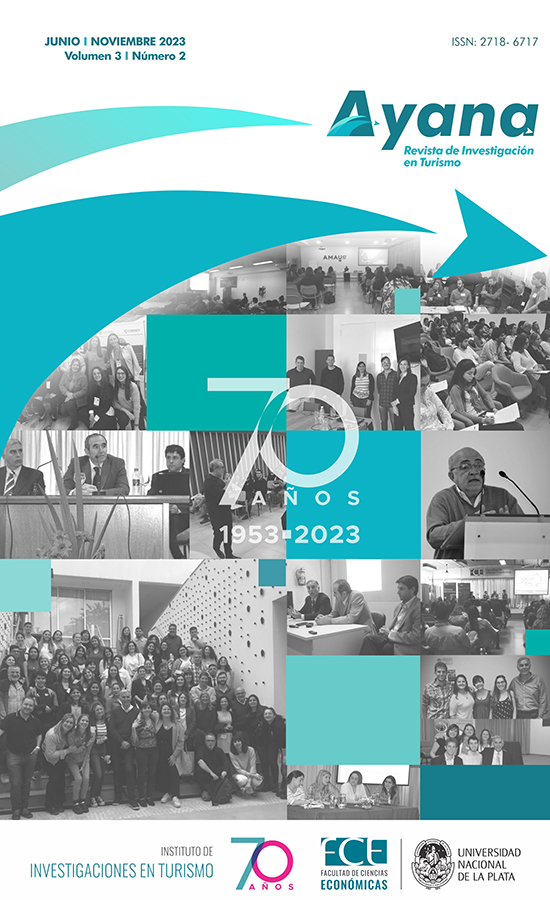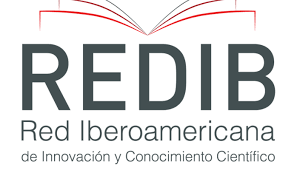Hunting tourism: An approach from the perspective of local social actors in the Southwest of Buenos Aires province (Argentina)
DOI:
https://doi.org/10.24215/27186717e036Keywords:
local social actors, tourism product, southwest of Buenos Aires province, hunting tourismAbstract
In recent years, hunting tourism in emerging destinations has become an activity that has acquired notorious characteristics. This is a consequence of the global evolution in tourism supply and demand trends in relation to local territorial dynamics.
Within this framework, the research aims to characterize the sport hunting as a tourism product in the Southwest of the province of Buenos Aires (Argentina) from the social actors conceptions involved in its development, in order to know the strengths, limitations and trends around the sustainability of the activity. The methodological approach proposes a qualitative-quantitative approach with an exploratory and descriptive scope, which allows to know in an integral way the complex reality referred to the tourism product under analysis.
Based on the results obtained, it appears that hunting tourism in the study area presents characteristics that show the coexistence of patterns typical of the Fordist model together with initiatives of responsible practices. This is reflected in ambivalences that still persist in socio-economic, environmental and legal aspects.
Downloads
References
Aldeanueva Fernández, I. y Cervantes Rosas, M. (2020). El desarrollo sostenible como imperativo estratégico: el contexto de la pequeña y mediana empresa latinoamericana. Revista Lasallista de Investigación, 16(2), 28-43. https://doi.org/10.22507/rli.v16n2a3.
Andruvetto, M. del V. (2009). Turismo cinegético sustentable: ¿una nueva alternativa de desarrollo económico para el sur de la provincia de Córdoba? Tesis de grado. Universidad Siglo 21. https://repositorio.uesiglo21.edu.ar/handle/ues21/11807
Azcárate T., Benayas J., Nerilli G. y Justel A. (2019). Guía para un turismo sostenible. Retos del sector turístico ante la Agenda 2030. Red Española para el Desarrollo Sostenible e Instituto de Turismo Responsable.
Bertoni, M. (2008). Turismo sostenible: su interpretación y alcance operativo. Cuadernos de Geografía: Revista Colombiana de Geografía, 17, 155-163. https://doi.org/10.15446/rcdg.n17.10925
Bragagnolo, C., Gama, A., Vieira, F., Campos-Silva, J., Bernard, E., Malhado, A., Correia, R., Jepson, P., De Carvalho, S., Efe, R. y Ladle, R. (2019). Hunting in Brazil: What are the options? Perspectives in Ecology and Conservation, 17(2), 71-79. https://doi.org/10.1016/j.pecon.2019.03.001
Citlalli Hernández Nogueda, V. (2016). Prefordismo, Fordismo y Postfordismo en el turismo: modelos para el análisis del turismo. Revista Turydes: Turismo y Desarrollo, 21. http://www.eumed.net/rev/turydes/21/fordismo.html
De Filippi, F. (2008). Manual para inspectores de fauna silvestre. Universidad del Salvador.
Fernández Tabales, A. (2008). La invención de nuevos lugares turísticos. En S. Antón Clavé y F. González Reverté (Coords.), A propósito del turismo. La construcción social del espacio turístico (pp. 185-206). Universitat Oberta de Catalunya.
Fullana, P. y Ayuso, S. (2002). Turismo sostenible. Rubes Editorial.
Gallopin, G. (2003). Sostenibilidad y desarrollo sostenible: un enfoque sistémico. CEPAL. https://repositorio.cepal.org/handle/11362/5763
Gallucci, S. (2021). Abordando las políticas turísticas como arenas de poder en el contexto latinoamericano. En M. Panaia (Ed.), Turismo. La otra mirada (pp. 137-156). Editorial La Colmena.
Gómez Contreras, J. L. (2013). Del desarrollo sostenible a la sustentabilidad ambiental. Revista Facultad De Ciencias Económicas, 22(1), 115–136. https://doi.org/10.18359/rfce.643
Guimaraes, R. (2002). La ética de la sustentabilidad y la formulación de políticas de desarrollo. En H. Alimonda (Ed.), Ecología Política, Naturaleza, Sociedad y Utopía (pp. 53-82). CLACSO.
Hernández Sampieri, R., Fernández Collado, C. y Baptista L. P. (2006). Metodología de la investigación. Mc Graw Hill.
Hiernaux, D. (2008). Una década de cambios: la geografía humana y el estudio del Turismo. Scripta Nova. Revista Electrónica de Geografía y Ciencias Sociales, 12 (270).
Ivars, J. (2003). Planificación turística de los espacios regionales en España. Síntesis.
Marchena Gómez, M. (1994). Un ejercicio prospectivo: de la industria del turismo “Fordista” al ocio de producción flexible. Papers de Turismo, 14-15, 77-94.
Organización Naciones Unidas (ONU), Departamento de Asuntos Económicos y Sociales, División Desarrollo Sostenible. (19 de mayo 2023). Programa 21. https://www.un.org/spanish/esa/sustdev/agenda21/index.htm
Osorio García, M. (2010). Turismo masivo y alternativo. Distinciones de la sociedad moderna/posmoderna. Convergencia. Revista de Ciencias Sociales, 17 (52), 235-259. http://hdl.handle.net/20.500.11799/38385
Rengifo Gallego, J. I. (2010). Caza y turismo cinegético como instrumentos para la conservación de la naturaleza. Anales de Geografíade la Universidad Complutense, 30 (2), 163-186. https://revistas.ucm.es/index.php/AGUC/article/view/AGUC1010220163A
Rodríguez Sánchez, G. (2018). Desarrollo sostenible y turismo: realidades y controversias. Realidad, Tendencias y Desafíos en Turismo (CONDET), 16 (1), 100-118. http://revele.uncoma.edu.ar/index.php/condet/article/view/2005
Roldán Nogueras, J. D., Caridad Ocerin, J.M. y Pérez, J. (2017). El perfil del turista cinegético: un estudio de caso para Córdoba (España). International Journal of Scientific Management and Tourism, 3(4), 187-203.
Roman, F. (2008). Turismo y sostenibilidad una relación compleja. De la UNLa - Universidad Nacional de Lanús.
Santos Pavón, E. y Fernández Tabales, A. (2010). El litoral turístico español en la encrucijada: entre la renovación y el continuismo. Cuadernos de Turismo, 25, 185-206. https://revistas.um.es/turismo/article/view/109631
Touraine, A. (1994). Crítica de la Modernidad. Fondo de Cultura Económica. http://ridaa.unq.edu.ar/handle/20.500.11807/1312
Ullah, I. y Young Kim, D. (2020). A Model of Collaborative Governance for Community-based Trophy-Hunting Programs in Developing Countries. Perspectives in Ecology and Conservation, 18 (3), 145-160. https://doi.org/10.1016/j.pecon.2020.06.004
Vázquez Cañizares, J. C. (2014). La caza furtiva como delito patrimonial autónomo. Andavira.
Vieytes, R. (2004). Metodología de la investigación en organizaciones, mercado y sociedad: epistemología y técnicas. Editorial de las Ciencias.
Winter, C. (2020). A review of research into animal ethics in tourism: Launching the annals of tourism research curated collection on animal ethics in tourism. Annals of Tourism Research, 84. https://doi.org/10.1016/j.annals.2020.102989
Downloads
Published
How to Cite
Issue
Section
License
Copyright (c) 2023 Maria Joselina Caruso, Soledad Gallucci, Aldana Mastrandrea, Tanja Meyer

This work is licensed under a Creative Commons Attribution-ShareAlike 4.0 International License.
Those authors who have publications with this journal, agree with the following terms:
a. Authors will retain its copyright and will ensure the rights of first publication of its work to the journal, which will be at the same time subject to the Creative Commons Atribución-NoComercial-SinDerivadas 4.0 Internacional (CC BY-NC-ND 4.0) allowing third parties to share the work as long as the author and the first publication on this journal is indicated.
b. Authors may elect other non-exclusive license agreements of the distribution of the published work (for example: locate it on an institutional telematics file or publish it on an monographic volume) as long as the first publication on this journal is indicated,
c. Authors are allowed and suggested to disseminate its work through the internet (for example: in institutional telematics files or in their website) before and during the submission process, which could produce interesting exchanges and increase the references of the published work. (see The effect of open Access)

























